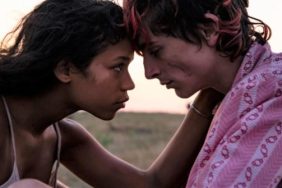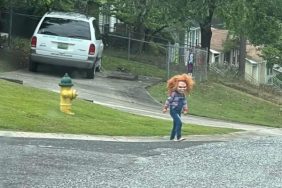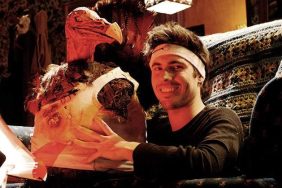Jonathan Levine became a big director even though nobody had seen his first movie. All the Boys Love Mandy Lane was caught in a legal entanglement for many years while Levine made The Wackness, 50/50 and Warm Bodies. Radius TWC finally unlocked Mandy Lane and released it, currently on VOD and in theaters this weekend. Amber Heard stars as Mandy, the object of high school boys’ hormones and mean girls’ scorn. At a weekend getaway, the drama explodes as a killer stalks the teens. We got to speak with Levine by phone as his first film finally makes it to movie screens.
Crave Online: What if the girls love Mandy Lane too? Why are you leaving them out?
Jonathan Levine: Yeah, I know. All the Boys and Girls Love Mandy Lane is too many words, dude. Can’t do it.
Was the idea that a horror movie would be a good first feature?
It wasn’t quite as calculated as that. Maybe it was, not for me but for all the people involved. It started out, our producers started developing this script at AFI which is where I went to film school with them. I think the notion was you write a script, first of all horror movies are a great calling card because you can really push the envelope with style and with content in a way that other genres don’t tolerate and still have a level of commercial potential and if you do it creatively, you’re really rewarded I think commercially. And also, they’re cheap and also if you do one that revolves around one location, it’s especially cheap. I definitely think for up and coming filmmakers, people graduating from film school, people that want to do their own movies, horror movies are a great way to go.
But these producers and Jacob [Forman] who wrote it, who went to film school with me, they took it to a very late part in the game where they wrote it, they developed it and they got it financed. I just sort of came on as a director for hire once the financing was in place. The idea in my doing it was I liked the script and I was working at a talent agency as an assistant and what the fuck else was I doing? Of course I was going to go direct a feature. It was not a calculated move on my part. It was just I get to go to Texas, make a feature with my friends and I really liked the script.
Poor Whitney Able ran her ass off and no one saw it for six years.
Oh my God, she is badass, dude. She’s so good. She is so incredibly committed. She could have gotten away with doing half that but she went full on. I remember, it was the first time I’d really worked with actors on such an intimate level. I had worked with actors in film school a little bit but we were together for months and I just saw how committed Whitney was. It was the first time I really started to love what actors did. It was the first time I really appreciated what actors did, how they would just invest 100% of themselves into something. I think for a while I was probably like, “Oh, these guys are just like whatever. They show up, they don’t work that hard, blah blah blah.” And then when I saw what Whitney did, I was like wow, no. They put their heart and soul into this stuff and what I do is bullshit.
And it’s a pretty long take of her running also.
Dude, yeah and she did it 10 times and she wasn’t wearing shoes. She was not wearing shoes because she wanted to feel the pain of her character, and she was running over rocks. Yeah, it’s crazy.
Was the teen violence ever a hurdle? It was really all contractual issues that held up the movie.
No, there was never a violence issue. The holding up of the movie, there’s no real secret there. We sold it to the Weinsteins. We wanted a wide release. They thought it was more of a specialty release. We encouraged them to talk to these other people. These other people went under. It got tied up in legal things and then we eventually realized that they were probably right and it was more of a specialty release and they were kind enough to buy it back, but it took forever. That’s really it. It was never anything about violence or really content at all. I think horror movies are the one place where it’s safe to push the envelope because that’s what’s encouraged and it’s really fun. You’re never worried about content in a horror movie. If anything, you’re worried about not going far enough.
Was it a unique exercise to construct a slasher movie where a lot of the weapons are guns?
Yeah, I think there’s a few things that were done in the script that made it interesting to me. Yes, you don’t usually see that. Usually the kills are almost Wile E. Coyote kind of things in horror movies. I think for me, the groundedness of the violence was something I was really attracted to. That was the reason I did the movie and what I think was pretty cool about the movie. It kind of straddles a few different lines between horror and just straight drama and slasher and comedy. It sort of helped me create the template for what I would later try to do in other movies which is just a very grounded but heightened world. So yeah, we were never thinking about the kills in this sort of Nightmare on Elm Street kind of way. We were thinking about how would this really go down? It was always about grounding things in psychology and real life logistics.
Was The Wackness an extension of wanting to explore young adults and teens in a movie?
Yeah, I think it has always been a time that has appealed to me and been interesting to me because I think when you are that age, your perspective on the world is the most cinematic, for lack of a better word. Every day you have extreme highs and extreme lows. Every day is this very intense thing because you’ve never experienced those things you’re experiencing as an adolescent before. Sex is just coming in and with that, love, and with that, heartbreak. There’s all these very inherently dramatic things happening to you.
You can articulate that in a movie and really get into the point of view of those characters and your only mandate is to deliver the point of view of those characters in a way that those characters are thinking in these great cinematic romantic ways. So you are entitled as a director to take those liberties, whether it be with music or with camera movement or stuff like that. Both of those films, I think John Hughes was a huge inspiration. All the characters in his movies are these hopeless romantics and I think the point of view of those films to a certain extent has a kind of bittersweet romance to it.
At the end of Mandy Lane when you reveal the bodies, what is that flicker? Is that a post effect?
No, it’s not. My cinematographer Darren Genet who did such a fantastic job and now shoots “The Vampire Diaries,” it was something that at the time Tony Scott had just used. It’s a hand cranked camera so basically you’re cranking the film through the camera at your own speed, so you have all these speed ramps and you have a little bit of a flicker. It’s the way that old cameras were built. When you see the Lumiere Brothers films and there’s that flicker, that’s part of the reason why. It was something that Tony Scott had been using for Man on Fire and we decided to sort of appropriate it and we used it a few times throughout the movie.









